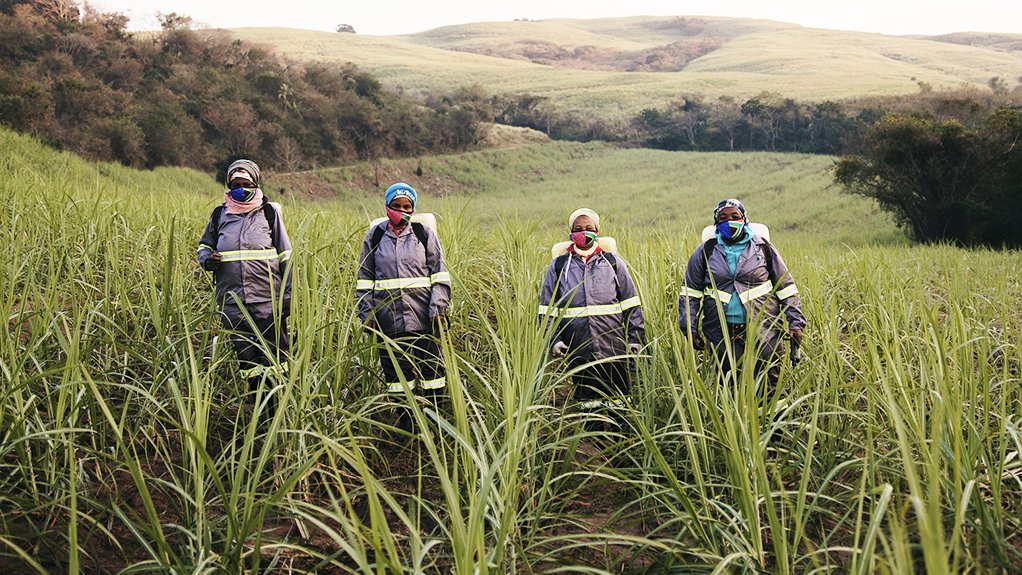Master plan to help industry diversify



MAKING ENDS SWEET This creation of new revenue streams will help sustain the local sugar industry and can potentially increase employment
DON’T SUGARCOAT IT The local industry has already seen a shift to increased local procurement by local customers, with stakeholders committing to sourcing 80% of sugar requirements locally
The implementation of South African Sugarcane Value Chain Master Plan can help the sugar industry diversify its revenue streams and build support for local sugar production, according to local sugar producer Tongaat Hulett sugar operations MD Simon Harvey.
The sugar master plan seeks to create diversified revenue streams for sugar producers.
Harvey asserts that there are a number of products other than sugar that can be produced from sugarcane, and from the by-products of the sugar manufacturing process. These include ethanol, biofuels, electricity and bioplastics.
He states that the master plan will reduce the prospect of farmers converting from sugarcane to other crops, however, crop diversification will continue to assist in converting marginal cane land to alternative crops to improve the viability of cane growers.
Harvey explains that the first phase of the master plan will focus on urgently progressing further transitional support, as well as progressing the long-term strategy for the sugar industry with support from industry stakeholders and social partners.
This will be done by seven different task teams that will be established. The work of these task teams, particularly by the “sugarcane-based value chain diversification strategy” task team, aims to unlock value for downstream operations for the benefit of all stakeholders, according to Harvey.
This creation of new revenue streams will help sustain the local sugar industry and can potentially increase employment.
To capitalise on this diversification, Harvey claims that Tongaat Hulett will need to invest resources and form strategic partnerships with parties that already have technologies or projects under way related to these diversified products.
This can also include biorenewable plastics, biodegradable plastics, packaging and cogeneration.
“Ethanol and bioelectricity both present ideal growth opportunities for us. We already produce electricity in all of our local mills, some of which is supplied back to the grid, but the opportunity exists to do so far more efficiently.”
As an example, he highlights the fact that in Zimbabwe – where Tongaat Hulett owns agriculture-based sugar subsidiary Triangle Limited and is a majority shareholder in Hippo Valley – ethanol is produced from molasses for blending with fuel.
He adds that the company already has expertise present in Zimbabwe, with Triangle having the capacity to produce 41-million litres a year of ethanol.
Blending ethanol with fuel also reduces local fuel imports, releases fewer emissions into the environment and is considered to be a better fuel source for vehicles, suggests Harvey.
Local Production, Procurement
While the sugar master plan was signed last November, Harvey points out that as a social compact, many local sugar manufacturers and retailers already began implementing the recommendations prior to November.
“We have already seen a shift to increased local procurement by local customers. The local sugar industry stakeholders have committed to sourcing 80% of all their sugar requirements from the local sugar industry.”
The initial commitment from 2020/21 is to source 150 000 t from the local industry. Over the next two years, the commitment is 300 000 t, with users sourcing at least 95% of all sugar requirements from the local sugar industry.
He also maintains that the local sugar industry has also agreed to exercise price restraint, providing more certainty to industrial users.
Further, the industry has agreed to effecting price increases for industrial users outside peak trading periods. This will ensure that price increases to customers will not exceed the annual consumer price index increases.
“In the short term, the price constraint will bring about certainty to the consumers and industrial users. It also pushes Tongaat Hulett to develop more savvy marketing and distribution strategies.”
Harvey also reiterates that the increased local offtake will offset the reduction in price increases to some degree.
“When sugar is not sold locally, it is in most cases exported into the world market at a loss. As such, the increased local uptake increases the amount of sugar that we can sell into the local market, and reduces our largely unprofitable export sales,” he concludes.
Article Enquiry
Email Article
Save Article
Feedback
To advertise email advertising@creamermedia.co.za or click here
Press Office
Announcements
What's On
Subscribe to improve your user experience...
Option 1 (equivalent of R125 a month):
Receive a weekly copy of Creamer Media's Engineering News & Mining Weekly magazine
(print copy for those in South Africa and e-magazine for those outside of South Africa)
Receive daily email newsletters
Access to full search results
Access archive of magazine back copies
Access to Projects in Progress
Access to ONE Research Report of your choice in PDF format
Option 2 (equivalent of R375 a month):
All benefits from Option 1
PLUS
Access to Creamer Media's Research Channel Africa for ALL Research Reports, in PDF format, on various industrial and mining sectors
including Electricity; Water; Energy Transition; Hydrogen; Roads, Rail and Ports; Coal; Gold; Platinum; Battery Metals; etc.
Already a subscriber?
Forgotten your password?
Receive weekly copy of Creamer Media's Engineering News & Mining Weekly magazine (print copy for those in South Africa and e-magazine for those outside of South Africa)
➕
Recieve daily email newsletters
➕
Access to full search results
➕
Access archive of magazine back copies
➕
Access to Projects in Progress
➕
Access to ONE Research Report of your choice in PDF format
RESEARCH CHANNEL AFRICA
R4500 (equivalent of R375 a month)
SUBSCRIBEAll benefits from Option 1
➕
Access to Creamer Media's Research Channel Africa for ALL Research Reports on various industrial and mining sectors, in PDF format, including on:
Electricity
➕
Water
➕
Energy Transition
➕
Hydrogen
➕
Roads, Rail and Ports
➕
Coal
➕
Gold
➕
Platinum
➕
Battery Metals
➕
etc.
Receive all benefits from Option 1 or Option 2 delivered to numerous people at your company
➕
Multiple User names and Passwords for simultaneous log-ins
➕
Intranet integration access to all in your organisation




















